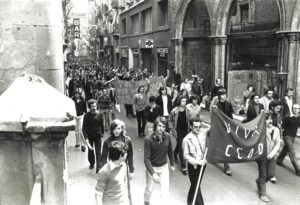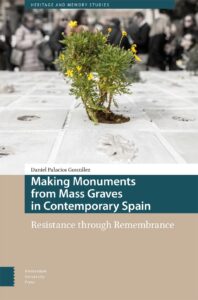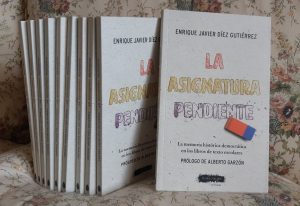Akiko Tsuchiya and Aurélie Vialette (eds.) Albany: State University of New York Press, 2025. 320 pp. ISBN 9798855800845 (hardback) A review by Jo Labanyi, New York University As the editors of this volume note, Spain has been slow to recognize the human rights abuses, including slavery, resulting from its former empire, in part because of …
Guillermo León Cáceres, National Distance Education University (UNED) Cover image: A Travelling Seminar with the EUROM Team and AMECADEC (2024). Photograph: EUROM A Brief History of Castuera Concentration Camp In March 1939, as the Spanish Civil War drew to a close, the Francoist military authorities built a concentration camp for prisoners on the outskirts of …
Kostis Kornetis, Universidad Autónoma de Madrid. Academic Advisor of the Commissioner for the Commemoration of “Spain in Freedom: 50 years” Cover image: Screenshots from the video of the campaign Democracy Is Your Power, presented as the closing highlight of the Spain in Freedom commemoration. The word ‘restless’ in this article’s title echoes Inquietud. Libertad y …
By Carmina Gustrán Loscos, Commissioner for the Commemoration of “Spain in Freedom: 50 years”. 20 November 2025 marks the fiftieth anniversary of Francisco Franco’s death. At the Commission of “Spain in Freedom: 50 years”, we focus on the possibilities that his passing created, on the long and difficult journey towards regaining freedom and democracy. In 2025, we remember the beginning of that collective achievement; we celebrate the prosperous, diverse and democratic nation that we have become. Also, we would like to invite all citizens to join us in reflecting on the future, on what kind of country and what kind of democracy we aspire to build together.
In the 1970s, the collapse of the Estado Novo (New State) and the Francoist state took place, two of the longest-lasting dictatorships in the contemporary history of Western Europe. This year marks half a century since the military coup carried out by officers of the Armed Forces Movement (MFA) that overthrew Prime Minister Marcelo Caetano, leading to the Carnation Revolution on 25 April 1974. Next year will mark 50 years since the death of the dictator Francisco Franco on 20 November 1975, who became head of state during the Spanish Civil War (1936-1939) and the beginning of the political shift towards the transition to democracy in Spain.
By David González, European Observatory on Memories (EUROM) “The Teacher Who Promised the Sea” is a Spanish-produced film directed by Patricia Font, starring Enric Auquer and Laia Costa in lead roles. This fictional feature is inspired by the true story of Antoni Benaiges, a Republican teacher from the Freinet pedagogical school, who was killed by …
We never quite know what to do with memorials. Sometimes we debate whether to tear them down or not, or even consider turning them into outdated memory centres which have proven useless time and time again, beyond allowing the government of the day to draw a line under the matter.
The participation of Spanish women in the French Resistance remains one of the great unresolved issues in the historiography of Republican exile and the Second World War. For decades, researchers and activists on both sides of the Pyrenees have denounced their neglect by both academia and society, an assertion that is now largely untrue. In recent years, the growing concern for gender issues and women’s history has led to a greater public presence and their inclusion across the board in the most recent research. However, there are still no specific studies of this particular group of women, largely due to the problem of the limited availability and fragmentation of sources, as well as the way in which they have been constructed in memorials since 1944.
Carolina Astudillo writes about her latests feature film, Song to a lady in the shadow (2021)
La asignatura pendiente. La memoria histórica democrática en los libros de texto escolares Javier Díez Gutiérrez and Enrique Javier. Madrid: Plaza y Valdés. 2020. Reviwed by David González, project manager at the EUROM Although the book in front of us saw the light of day in 2020, it is the outcome of many years of …









